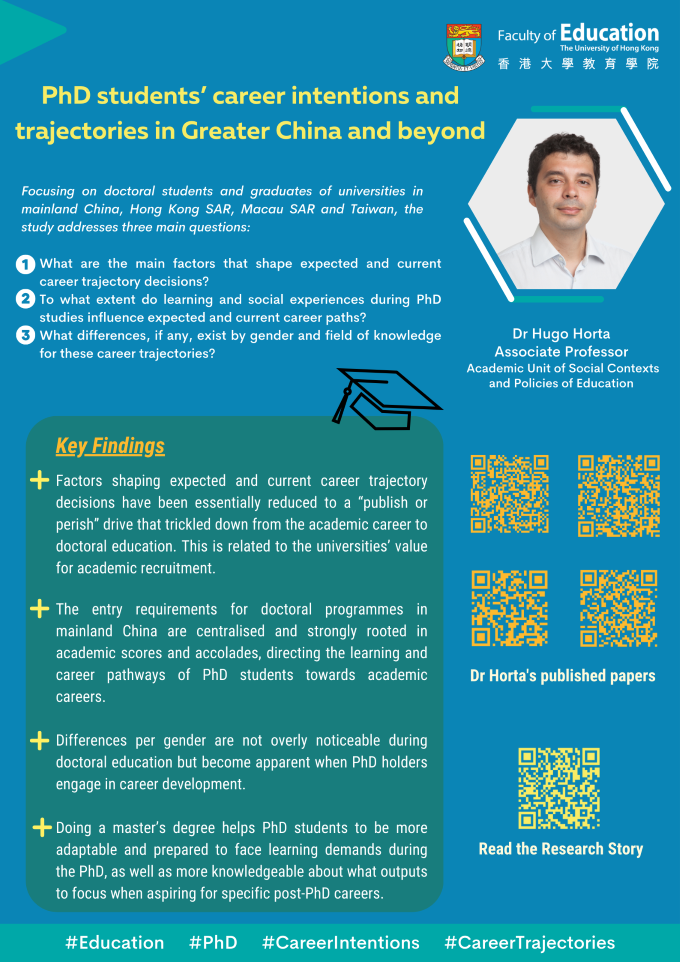Research Story – PhD students’ career intentions and trajectories in Greater China and beyond

There is an increasing number of young people interested in doing a PhD. Meanwhile, a mounting number of PhD students and graduates face increasingly constrained academic labour markets. In this context, understanding the motivations, interests, and experiences of PhD students is relevant because they will be, in principle, some of the core creators of present and future knowledge, and many of them will be teaching or training new generations of young people, as they experience academic and non-academic workplaces. Doing a PhD is also onerous in terms of resources and time and can be a life-changing experience. Studies assessing the experiences, motivations and intended career trajectories of PhD students have focused overwhelmingly on Europe, North America, and Oceania, while a lack of such studies in East Asia is evident.
The project led by Dr Hugo Horta, Associate Professor in the Faculty’s Academic Unit of Social Contexts and Policies of Education (SCAPE), aimed to understand the main factors shaping the expected and current career trajectories of PhD students and graduates in the region known as Greater China, including mainland China, Hong Kong SAR (HKSAR), Macau SAR and Taiwan. The other key participants in the project are Professor Wenqin Shen from Peking University, Professor Rui Martins from the University of Macau, and Porfessor Sheng-Ju Chan from National Chung Cheng University. Dr Jung Jisun, Assistant Professor in the Faculty’s Academic Unit of SCAPE, and two PhD students, Huan Li and Li Tang, also contributed to the research.
The project involved two main studies. The first one concerned the importance that studying at master’s level can have in informing PhD students about the doctoral learning experience and possible career options. The study was based on 59 interviews of mainland Chinese students doing a PhD in universities in mainland China and HKSAR. The findings suggest that doing a master’s degree before starting a PhD is beneficial in facilitating a richer, more adaptable, and fulfilling doctoral experience, since the students with master’s experience know better what to expect from doctoral education. These students also have a better understanding of potential career options during the PhD study, and are better able to prepare themselves when targeting an academic job. This research also dismisses the idea that analyses of PhD experience and career pathways should commence when the PhD study starts. The study demonstrates that previous educational experiences are critical to defining doctoral experiences and career trajectories construed during doctoral learning.
This study was published in the journal Studies in Continuing Education, co-authored by Huan Li, Dr Jisun Jung and Dr Hugo Horta, and titled “The same starting line? The effect of a master’s degree on PhD student’s career trajectories”.
The second main study aimed at understanding critical factors that would influence specific career preferences. The study was based on a qualitative analysis of 90 interviews with mainland Chinese doctoral students in universities in mainland China, HKSAR, and Macau SAR. Surprisingly, all the factors were reduced to a single purpose and objective: to publish papers in indexed peer-reviewed journals. The entire PhD experience of the students became one of “publish or perish”, dictated by their understanding that the credentialisation of publications matters most in attaining an academic job in a mainland Chinese university (their prime labour market). This focus on “publish or perish” may result in the dismissal of the role and relevance of important activities such as coursework, conference participation, teaching assistantships, engagement with outside stakeholders and networking. The issue is not with the PhD students, who rationally perceive the symbolic and valuable production they need to aim for if they aspire to work in academia, but rather with the requirements for academic recruitment at mainland Chinese universities (an overdependence on publications and related publication statistics).
This study was published in the journal Studies in Higher Education, co-authored by Dr Hugo Horta and Huan Li, titled: “Nothing but publishing: the overriding goal of PhD students in mainland China, Hong Kong and Macau”.
For other findings and studies published on this project, please read Dr Horta’s other published articles:
Horta, H., & Tang, L. (2023). Male and female academics’ gendered perceptions of academic work and career progression in China. Higher Education Quarterly. https://doi.org/10.1111/hequ.12419
Jung, J., Li, H., & Horta, H. (2023). Procedures, criteria and decision-making in doctoral admissions: The case of China’s leading research universities. Assessment & Evaluation in Higher Education, 1–16. https://doi.org/10.1080/02602938.2023.2179595
Li, H., & Horta, H. (2021). Factors influencing PhD students’ intentions to pursue careers in the government and nonprofit sectors: Evidence from a global survey. Higher Education Research & Development, 41(6), 1946–1961. https://doi.org/10.1080/07294360.2021.1948975
Tang, L., & Horta, H. (2021). Studies on women academics in Chinese academic journals: A review. Higher Education Quarterly, 76(4), 815–834. https://doi.org/10.1111/hequ.12351
Tang, L., & Horta, H. (2021). Women academics in Chinese universities: A historical perspective. Higher Education, 82(5), 865–895. https://doi.org/10.1007/s10734-020-00669-1
